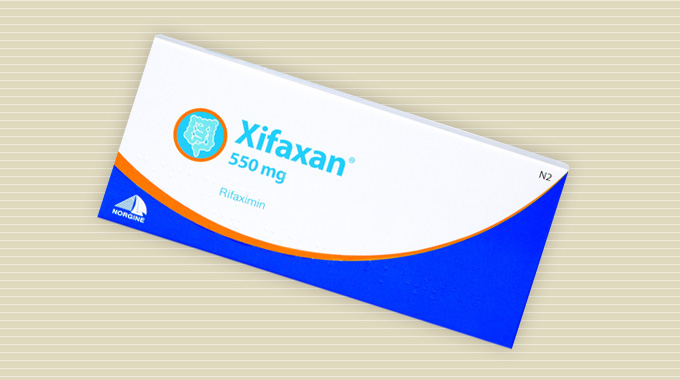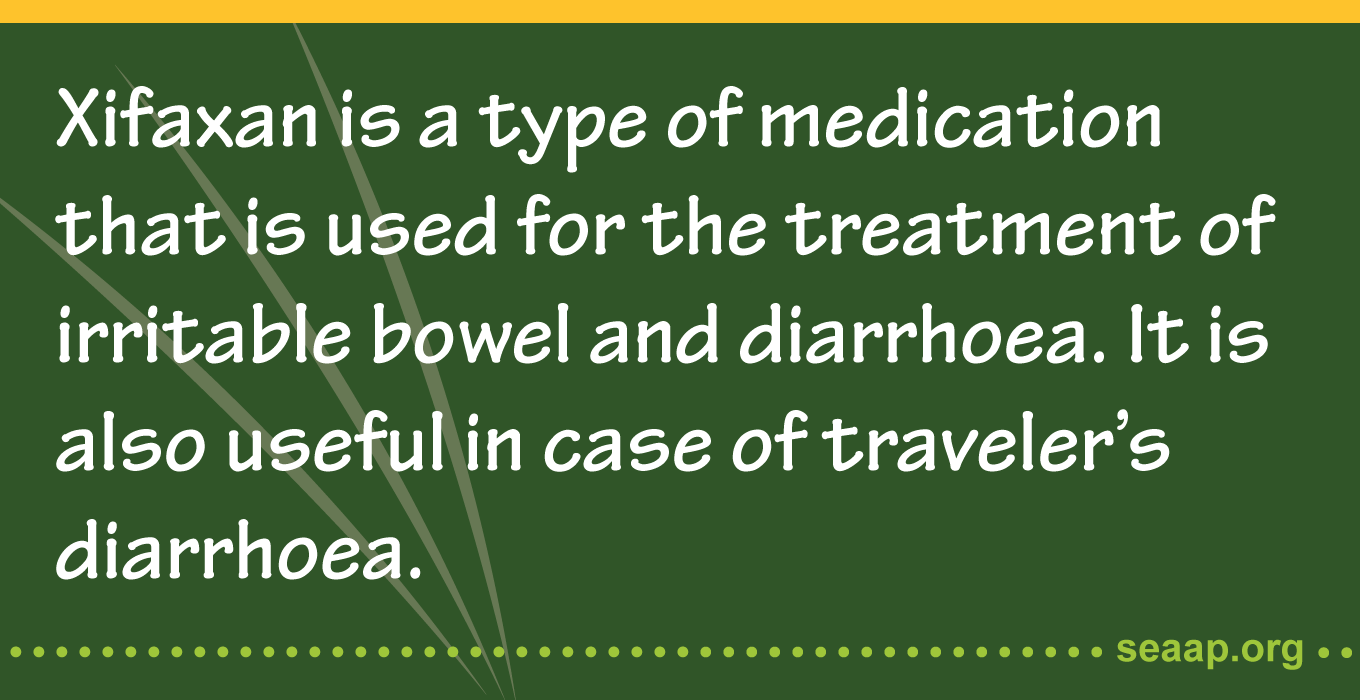Xifaxan (rifaximin)
Xifaxan is a type of medication that is used for the treatment of irritable bowel and diarrhoea. It is also useful in case of traveler’s diarrhoea. The chances of reappearance of hepatic encephalopathy in adults can be reduced by the help of xifaxan. This antibiotic drug prevents the growth of bacteria in the body. They are commonly found in the form of tablets.

Dosage
The dosage of Xifaxan (rifaximin) can vary depending on the specific condition being treated and the individual's medical history. It is important to follow the dosage instructions provided by your healthcare professional or the prescribed label.
For adults with traveler's diarrhea or irritable bowel syndrome with diarrhea (IBS-D), the usual dosage of Xifaxan is 550 milligrams (mg) taken orally three times a day for a duration of 3 days.
For the treatment of hepatic encephalopathy, the recommended dosage of Xifaxan is 550 mg taken orally twice a day.
Dosage adjustments may be necessary for individuals with impaired liver function or certain other medical conditions. It is important to consult your healthcare provider for precise dosage instructions based on your specific needs.
Composition
The key ingredient in xifaxan is rifaximin. It is a non-aminoglycoside and semi-synthetic antibiotic drug. The inactive ingredients present in xifaxan are:
- Sodium starch glycolate
- Titanium dioxide
- Talc
- Propylene glycol
- Microcrystalline cellulose
- Disodium edetate
- Colloidal silicon dioxide
- Glycerol palmitostearate
- Hypromellose
- Red iron oxide
Polyvinyl is also found additionally in 550 mg tablets of xifaxan.
Uses
It helps in treating diarrhoea resulting from a bacteria named E. coli (traveller’s diarrhoea). Fever and bloody diarrhoea can also be cured with the help of this medication. The bacterial growth is stopped in the treatment process.
Xifaxan can treat bacterial infections only. They will not cure viral infections (like common cold and flu). Unnecessary usage and misuse of this drug can decrease the efficiency of the drug. Xifaxan can treat diarrhoea and irritable bowel movement. Brain problems resulting from liver disease (hepatic encephalopathy) can be stopped using this medication.
Side-effects
Using xifaxan can give rise to many side-effects in the body which might require medical attention. Some of them are mentioned below:
- Loss of appetite
- Hearing loss
- Dry lips
- Decreased urination
- Confusion
- Abnormal dreams
- Swelling of the lower legs, ankles, hands, and feet
- Stomach pain
- Full feeling
- Difficulty in breathing
- Bloated
- Fever
- Headache
- Reduced heat inside the body
- Large, hive-like swelling on the hands, legs, sex organs, feet, face, throat, eyelids, and lips
- Rashes and itchy skin
- Scaly skin
- Woollen, red skin
- Redness of the skin
- Unusual bruising and bleeding
- Unusual weakness and tiredness
- Ulcers, sores and white spots inside the mouth
- Sensation of spinning
- Feeling like the surrounding is moving
- Sunken eyes
- Increased heartbeat
- Buzzing noises inside the ears
- Fainting
- Chest pain
- Blood along with urine
- Bloody nose
- Dizziness or light-headedness
- Breathlessness
- Trouble in falling asleep
- Rapid breathing
- Black, tarry stools
- Muscle spasm

Contraindications
Under the following medical conditions, the patient should not be prescribed xifaxan:
- Severe liver disease
- Clostridium Difficile Bacteria Related Colitis
- Pregnancy
- Allergy to rifamycin analogues
Xifaxan and pregnancy
Animal studies have found that there are evidences of adverse effects to the new born child when the medicine is consumed by the mother. There has not been any controlled data on humans regarding this. Therefore, it is important to note that this antibiotic drug should only be prescribed to a pregnant mother if the benefits outweigh the potential risks involved.
Some frequently asked questions about Rifaximin
What is rifaximin?
Rifaximin is an antibiotic medication used to treat certain bacterial infections, particularly those affecting the gastrointestinal tract.
What conditions are typically treated with rifaximin?
Rifaximin is commonly used to treat traveler's diarrhea, irritable bowel syndrome with diarrhea (IBS-D), and hepatic encephalopathy (a complication of liver disease).
How does rifaximin work?
Rifaximin works by inhibiting the growth of bacteria in the gastrointestinal tract. It does this by interfering with the production of proteins necessary for bacterial survival and replication.How is rifaximin taken?
Rifaximin is usually taken orally in the form of tablets. The dosage and duration of treatment will vary depending on the specific condition being treated. It is important to follow the dosage instructions provided by your healthcare professional or the prescribed label.
Are there any common side effects of rifaximin?
Common side effects of rifaximin may include diarrhea, abdominal pain, flatulence, nausea, and headache. If you experience severe or persistent side effects, it is important to contact your healthcare provider.
Can rifaximin interact with other medications?
Rifaximin has a low potential for drug interactions. However, it is important to inform your healthcare provider about all the medications, supplements, and herbal products you are taking to avoid any potential interactions.
Can rifaximin be used during pregnancy or while breastfeeding?
It is important to consult with your healthcare provider if you are pregnant, planning to become pregnant, or breastfeeding before taking rifaximin. Your doctor will assess the potential risks and benefits and determine if it is suitable for you.
Can I stop taking rifaximin if I feel better?
No, it is essential to complete the full course of rifaximin treatment as prescribed by your doctor, even if your symptoms improve. Stopping the medication prematurely can lead to incomplete eradication of the bacteria and increase the risk of recurrence.
Are there any precautions or warnings associated with rifaximin?
Rifaximin is generally well-tolerated, but it may not be suitable for individuals with a known hypersensitivity to rifaximin or any other ingredients in the medication. It is important to discuss your medical history and current medications with your doctor before taking rifaximin.
How should rifaximin be stored?
Rifaximin tablets should be stored at room temperature, away from moisture and heat. Keep them out of reach of children and dispose of any expired or unused medication properly.
- Download in PDF » Xifaxan: Product Information


